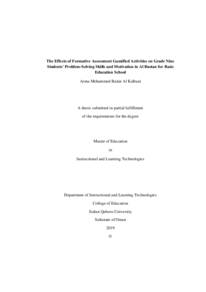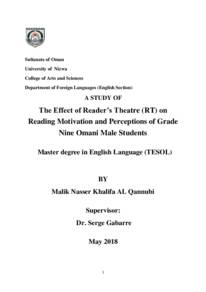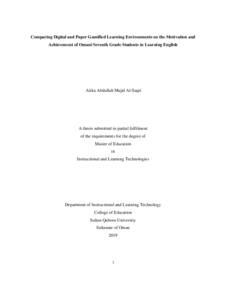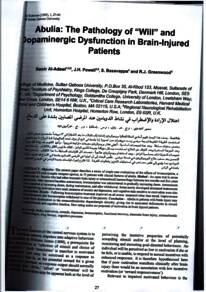Document
The Effects of Formative Assessment Gamified Activities on Grade Nine Students' Problem-Solving Skills and Motivation in Al Bustan for Basic Education School
Publisher
Sultan Qaboos University
Gregorian
2019
Language
English
English abstract
The use of gamification as learning tools is a promising approach due to the games' power to teach and the fact that they reinforce not only knowledge, but also important skills such as problem-solving (PS), collaboration, and communication (Alhammad & Moreno, 2018). Therefore, the purpose of this research was to investigate the effect of using gamified activities on grade nine students' problem solving skills and their motivation towards learning the IT subject. It seeks to answer two main questions; 1) To what extent do gamified activities improve grade nine students' problem solving skills? And 2) What is the impact of gamified activities on grade nine students' motivation towards the IT subject? A mixed method with a repeated measure design was adapted in this research. Two grade nine classes (n=47) participated in this research from Al Bustan for Basic Education school in Muscat Governorate. The gamified activities were used as formative assessment activities in grade nine IT classes. Those activities consisted of five gamification elements; levels, points, leaderboards, badges and challenges. Data were collected using four instruments; A) Scoring rubric, B) Observation rubric, C) Motivation scale, and D) Semi-structured interviews. The results indicated that; 1) the gamified activities gradually increased grade nine students' problem solving skill significantly and 2) The gamified activities affected positively on grade nine students' motivation towards the IT subject. In light of these research findings a longitudinal research is recommended to explore the effect of gamification on either sustaining or increasing the students' PS skills and motivation. Also, it is recommended to use the Analysis of covariance (ANCOVA) as a statistical analysis tool to investigate if the effects of gamification elements differ according to students' level of achievement.
Description
Thesis
Member of
Resource URL
Arabic abstract
يعد استخدام الأنشطة القائمة على التلعيب أحد استراتيجيات التعليم الواعدة نظراً لقدرة الألعاب ليس على تعزيز المعرفة فحسب، بل على تطوير مهارات هامه مثل مهارات حل المشكلات والتعاون والتواصل(Alhammad & Moreno, 2018) . لذلك هدفت هذه الدراسة إلى قياس أثر تطبيق الأنشطة المعتمدة على التلعيب في تطوير مهارة حل المشكلات لدى طالبات الصف التاسع ودافعيتهن نحو تعلم مادة تقنية المعلومات. وسعت الدراسة إلى الإجابة عن سؤالين رئيسيين: إلى أي مدى أثرت الأنشطة القائمة على التلعيب في تطوير مهارة حل المشكلات لدى طالبات الصف التاسع في مادة تقنية المعلومات؟، وما هو تأثير الأنشطة القائمة على التلعيب على دافعية طالبات الصف التاسع نحو تعلم مادة تقنية المعلومات؟. واستخدمت منهجية بحث مختلطة وتصميم تجريبي قائم على القياسات المتكررة، وشارك فصلان من الصف التاسع )العدد = 47 ( بمدرسة البستان للتعليم الأساسي بمحافظة مسقط في هذه الدراسة. وقد استُخدمت الأنشطة القائمة على التلعيب كأنشطة تقييم مستمر في وحدة مفاهيم حول الشبكات؛ وتمثلت عناصر التلعيب المستخدمة في هذه الدراسة في: النقاط، وقائمة المتصدرين، والمستويات، والتحديات، والشارات. وجمعت البيانات باستخدام أربع أدوات: أ( سلم تقدير الأنشطة، ب( أداة ملاحظة، ج( مقياس دافعية، د( مقابلات. وقد ظهرت نتائج الدراسة كالآتي: طورت الأنشطة القائمة على التلعيب مهارة حل المشكلات لدى طالبات الصف التاسع بشكل تدريجي، ورفعت الأنشطة القائمة على التلعيب دافعية طالبات الصف التاسع نحو تعلم مادة تقنية المعلومات. وعلى ضوء هذه النتائج عرضت الباحثة عدداً من التوصيات المتعلقة بالموضوع.
Category
Theses and Dissertations




